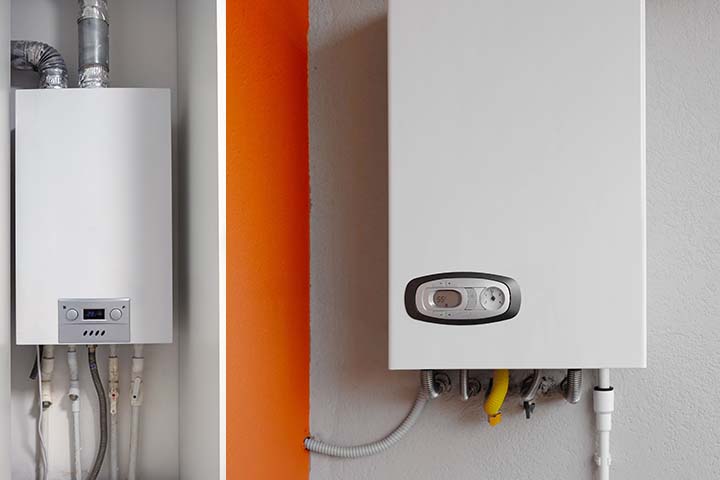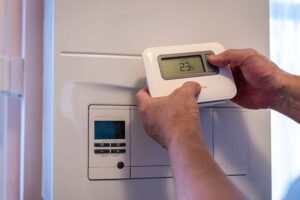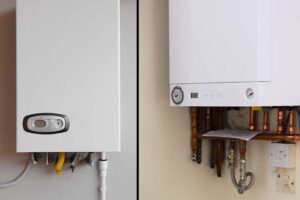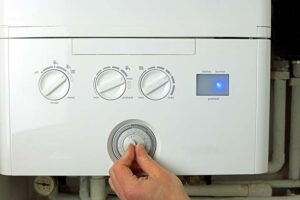Most people still wonder how to tell whether they have a condensing boiler or a non-condensing one. Most often, this confusion arises while applying for the ECO4 free boiler grant because the scheme requires an outdated non-condensing boiler to be replaced by a new condensing boiler in order to make every home energy efficient.
A good grasp of the distinctions between the two types will guide you to the most suitable boiler for your residence. We will provide a detailed account of condensing and non-condensing boilers in terms of efficiency, design, safety, price, and environmental impact in this post.
What Is a Condensing Boiler?
A condensing boiler is a contemporary condensing heating mechanism that harvests heat from the flue gases by means of a heat exchanger. It takes the latent heat from the steam in the flue gas, which normally would be lost, and thus the water gets heated more efficiently with less heat loss.
The energy-efficient modern condensing boilers can thus achieve up to 98% efficiency, meaning a mere 2% of energy waste. They are constructed to reduce carbon footprints and lower one’s gas bills. Condensing boilers are now the standard heating system commonly used in the UK in three types: combi boiler, system boiler, or regular boiler.
What Is a Non-Condensing Boiler?
A non-condensing boiler is an older kind of boiler that burns either gas or oil for heating water, wasting a great deal of the generated heat through the flue. These traditional boilers lack the ability to reuse heat and are therefore much less efficient. They normally have an efficiency rating below 80%.
Due to this fact, older non-condensing boilers consume more fuel and generate high carbon emissions. Under government schemes, such as ECO4, for improving the energy efficiency in homes, non-condensing models have now been replaced with high-efficiency condensing ones.
Condensing vs Non-Condensing Boilers
Difference in Efficiency
The efficiency difference is the primary reason between condensing boilers and non-condensing boilers. In general terms, a condensing gas boiler is as high as 98% efficient, while one that is not condensing will be less than 80%.
Condensing boilers trap the exhaust heat, using it again to heat the water. The non-condensing boilers release hot flue gases directly out through the flue, thus losing a lot of energy.
The increased efficiency of condensing technology not only saves money on higher bills but also minimizes the carbon footprint of the house, thus being environmentally friendly and cost-efficient simultaneously.
Reason for the Difference in Efficiency
Condensing boilers recycle heat from exhaust gases by means of a second heat exchanger, whereas non-condensing boilers allow the same to be lost as waste.
Difference in Design
A condensing boiler has a newer appearance and has a condensate pipe, typically a white PVC drain, that takes away the water created when water vapour cools, where it condenses.
Non-condensing boilers lack this pipe because they cannot create condensate. The boiler’s design is less efficient and simpler. One of the quickest ways to determine whether your boiler is condensing is to look for the condensate pipe.
Reason for Difference in Design
With condensing boilers, the flue gas is cooled to such an extent that water is formed and must be drained. Non-condensing boilers, however, do not condense vapor, so there is no need for a drain.
Difference in Safety & Reliability
The safety of condensing boilers is guaranteed by the sealed systems and modern technology that exists in them.
They take care of gas leaks, and they control pressure and heat better than the non-condensing boilers that rely on old technology with open systems and thus are more likely to suffer from leaks and breakdowns.
This is the reason why condensing boilers are a safer choice when it comes to your central heating system.
Reason for Difference in Safety & Reliability
Condensing boilers use a sealed system to avoid leakages, while traditional or non-condensing boilers opt for an open system, which is more prone to leakages and thus less reliable.
Difference in Maintenance & Lifespan
Condensing boilers represent modern condensing systems that require less care and are very durable. Their advanced heat exchanger and sealed design prevent the usual issues such as leaks or corrosion.
With regular servicing by a Gas Safe engineer, they may last over 15 years. On the other side, many non-condensing boilers suffer from heating system issues like leakage and waste of fuel, making them more costly to maintain and repair.
Reason for Difference in Maintenance & Lifespan
For condensing boilers, the materials used are advanced and very resistant to corrosion, thus they last for a long time.
On the other hand, non-condensing boilers use materials that are old and easily susceptible to wear and tear, which also means frequent repairs.
Difference in Price & Installation Cost
The initial cost for the condensing boiler, which includes the sophisticated technology, connection for the condensate pipe, and a condensate trap, is usually higher, but the energy bills will be significantly lower and the fuel efficiency will be much better.
A non-condensing boiler would be cheaper to get installed, but uses more gas over time. While modern condensing boilers are a bit more expensive, they boast of higher ratings and are considered value for money eventually.
Reason for Difference in Price & Installation Cost
Condensing boilers require a more complex system and a skilled technician for installation. Non-condensing boilers are less complicated, but their heating costs in the long run are higher.
Difference in Environmental Impact
Condensing boilers are way better for the environment. About 2.2 tonnes of CO2 emissions are the annual output of a typical condensing gas boiler. On the contrary, a non-condensing boiler emits CO2 in the range of more than 7.5 tonnes annually.
This indicates that energy-efficient boilers can significantly reduce your carbon footprint. Removal of the old and installation of a new condensing boiler model among the householders is a contribution to the emissions and, hence, helps the UK in achieving its net-zero goals.
Reason for Difference in Environmental Impact
Condensing boilers are more carbon efficient, as they take heat from the exhaust fumes and thus need less fuel to be burned while emitting less carbon. Traditional or non-condensing boilers use up heat and hence, emit more CO₂.
Condensing vs Non-Condensing Boiler: Pros and Cons
Condensing Boiler: Pros
- Up to 98% energy efficiency.
- Lower carbon emissions and eco-friendly.
- Saves money on energy bills.
- Longer lifespan and minimal maintenance.
- Meets UK efficiency standards.
Condensing Boiler: Cons
- Higher installation cost.
- Needs a condensate pipe.
- Requires annual servicing.
Non-Condensing Boiler: Pros
- Lower initial installation cost.
- Simple design, easy to use.
- Works well with older heating systems.
Non-Condensing Boiler: Cons
- Less than 80% efficiency.
- Wastes heat through the flue gas.
- Higher fuel bills and carbon emissions.
- Less safe and less reliable.
Are Non-Condensing Boilers Legal?
Non-condensing boilers are still lawful to utilize within the UK if already fitted. All new gas boilers, however, must be condensing models by law since 2005 under Boiler Plus rules.
This regulation serves to improve energy efficiency and minimize emissions within domestic boilers throughout the UK.
Is Boiler Condensate Harmful?
Boiler condensate comes out slightly acidic, but it’s not dangerous. It is a regular by-product of the condensing technology that goes through the condensate pipe without any trouble whatsoever.
It shouldn’t be touched or tasted, but it poses no danger when handled correctly by your boiler installation.
Is a Condensing Boiler the Same as a Combi Boiler?
Not really, a condensing boiler is totally different from a combi boiler. “Condensing” describes the technology used, while “combi” refers to a type of boiler that delivers heating and hot water simultaneously.
The majority of modern combi boilers are likewise condensing, hence ensuring high efficiency and occupying minimal space for domestic hot water requirements.
How Do I Know if My Boiler Is Condensing or Not?
To find out, check for a white plastic condensate pipe beneath your boiler—only condensing boilers will have it. Another indicator is when the boiler was installed.
Boilers installed after 2005 in the UK will probably be condensing models, while older models without a drain are non-condensing.
Final Thoughts
Once you understand the differences between condensing and non-condensing boilers, you can upgrade your heating system of your choice. A condensing boiler is a more energy-efficient, safer, and greener alternative.
If your old boiler is a non-condensing one, getting a new efficient condensing unit with the free boiler grant under the ECO4 scheme will be your sufficient reason to upgrade it.
An eco-friendly practice is heating your home, eliminating the massive energy bills, and reducing your carbon footprint simultaneously.
Frequently Asked Questions
A condensing boiler recycles warmth from waste gases, so it’s more energy efficient. A non-condensing boiler loses that heat down the flue, lowering efficiency.
Since 2005, any newly installed gas boilers in British homes have had to be condensing boilers in order to fulfill energy efficiency and emission requirements.
Installing a condensing boiler can save up to 30% on gas bills and decrease carbon emissions substantially.
Yes, condensing boilers can be installed in most homes, but qualified boiler fitters will inspect your system to correctly install and drain it.
No, condensing boilers typically require only annual servicing. Their new design and quality components minimize breakdowns and maintenance costs over the long term.







